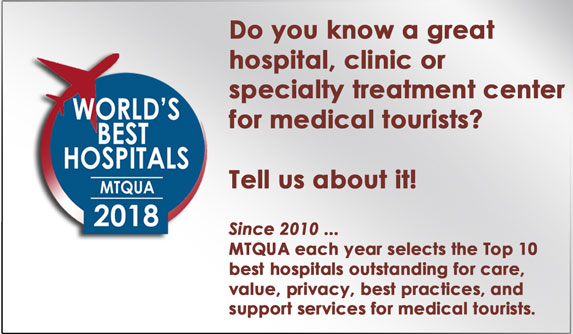MTQUA believes that all health care providers and partners should observe a health care ethic that respects the unique situation of the medical traveler. As the giving and receiving of health care goes global, we encourage all hospitals, institutions, medical professionals and related services to consider a bill of rights for international patients – specifically medical travelers – that supports good, safe, and appropriate medical outcomes.
Vulnerable to misunderstandings and inappropriate care, or subject to the vagaries of foreign laws that offer less or no protection in certain situations than they expect, patients crossing borders are dependent on the foreign care giver to offer appropriate care, observe high privacy standards and guard against undue risks to safety and quality.
A health care provider or medical tourism service partner, when accepting a medical traveler for care, makes both an explicit and implicit contract with the traveling patient. A contract with the patient should acknowledge these rights.
Most providers and some medical tourism companies already have a Patient’s Bill of Rights for local patients. International traveling patients, or medical travelers, have special and unique needs that are not addressed in the typical patient bill of rights.
We thank everyone who has contributed to this discussion of international patient’s rights and the rights of the medical traveler.
As a medical traveler, you have these rights.
Rights that apply particularly to medical tourists are written in bold below.
You have the right to choice of medical treatment.
1. To choose to travel to another country to request and receive responsible and responsive medical care and treatment; and receive continuing or follow-up medical care and treatment upon returning home.
2. To receive a thorough evaluation by knowledgeable providers and screening tools of high standards which facilitate disease detection.
3. To receive medical care and treatment of a standard of quality comparable to that received by any patient attended by the same physician in the same facility; receive this care and treatment for the same cost; and receive skilled emergency care if you need it.
4. To receive relief from suffering according to the current state of knowledge of pain assessment and management.
5. To expect continuity of care, including a written discharge summary with information about continuing health care requirements immediately following your discharge from treatment and about longer term care after you return home, and information about cooperation between all health care providers and/or establishments which are involved in your diagnosis, treatment, care and follow-up including names and contact details; and a description of how you can appeal your discharge if needed.
You have the right to information.
6. To request and receive, prior to treatment, an accurate and complete estimate of charges for your medical care or treatment.
7. To ask and be informed about the identity and professional status of the physician who will be coordinating your care, and of other health care providers who will see you, including qualifications related to your condition, such as education, medical license, board certification and recertification, years of practice, and experience and outcomes in performing the recommended procedures.
8. To ask and be informed about the health care facility, including accreditation status, experience in performing recommended procedures and services, performance results or outcomes, and presence of or access to appropriate technology; and about the facility’s rules, policies, practices, and events that relate to patient care, treatment and responsibilities.
9. To receive understandable and relevant information about your current health status, options for treatment with related risks and benefits, length of recuperation, details about the course of treatment, your prospects for recovery, other medical alternatives, and the possible and probable outcomes of receiving or refusing care; and you have the right to request interpretation into another language.
10. To receive information about all prescribed medications including their names and alternative names as they may be known by in your country of residence, their normal actions and potential side-effects as may apply to you.
11. To ask and be informed if your physician proposes to perform research, experimentation, clinical trials or teaching that may affect your care or treatment; receive a full explanation; and agree or refuse to participate in such activities. Your refusal must not affect the standard of your medical care.
12. To ask and be informed about the existence of business relationship among the hospital, treatment facility, other health care provider, payer or agent.
13. To review your medical records; receive a copy of your medical records and other health-information documents; request changes to your medical records by providing documents or information before admission and/or after discharge; and update your demographic data at any hospital through procedures that guarantee accuracy, credibility and confidentiality of updated information.
You have the right to choice.
14. To have a support person – a family member or other person of your choosing – present during examinations, tests, and meetings with your doctors. This includes your reasonable right to designate visitors during inpatient care in keeping with your health care facility’s restrictions, and to choose who, if anyone, should be informed on your behalf.
15. To receive timely and prioritized scheduling of consultations, surgery and treatment, and timely response to requests and inquiries when you have work and travel constraints.
16. To make decisions about your medical care including giving informed consent prior to any medical intervention; and receive information about any proposed treatment procedure or medication you need to enable such informed consent or to refuse a course of treatment.
17. To seek a second or further opinion and/or referral to other specialists; and leave the hospital, even against the advice of doctors, to the extent permitted by law.
18. To continue or refuse treatment to the extent permitted by applicable laws regardless of how mild or advanced your condition may be. If you refuse a recommended treatment you are entitled to other appropriate care and service that the hospital provides or transfer with full medical records to another physician or hospital.
19. To consent in writing for the preservation, disposition or use of all substances of your body, except when used in your current diagnosis, treatment and care.
20. To provide advance directives such as a living will, durable power of attorney for health care, or health care proxy that will be honored by medical personnel to the extent permitted by applicable law. Such directives may include designation of a decision maker in the event you cannot speak for yourself, and your preferences on issues related to resuscitative services and desire for or against life-sustaining treatment.
You have the right to privacy.
21. To receive treatment considerate and respectful of your personal values and beliefs, without regard to national origin, citizenship, country of residence, language, race, color, religion, ancestry, medical diagnosis, mental or physical disability, genetic makeup, educational background, gender, sexual orientation, marital status, economic status, or the source of payment for your care.
22. To receive evaluation and treatment in confidence and privacy, including in all written and electronic records, during case discussion, consultation, examination and treatment except where reporting is required by law.
23. To receive evaluation and treatment in facilities that ensure privacy during personal care, examinations and treatment; and interventions carried out only in the presence of those persons necessary for the intervention unless you agree.
You have the right to complaint.
24. To be informed of available resources for resolving disputes, grievances and conflicts, such as ethics committees, patient representatives, or any independent mechanisms available in the community, including ombudsmen and foreign consular representatives; have your dispute examined and dealt with thoroughly and in a timely manner; and be informed about the outcome.
Our mission and vision
Our team
Our services
Medical Traveler’s Responsibilities
 Medical Travel Quality Alliance offers this confidential service to medical tourists, their families and loved ones, and their home-based doctors as assurance a patient’s medical treatment and care is proceeding as planned.
Medical Travel Quality Alliance offers this confidential service to medical tourists, their families and loved ones, and their home-based doctors as assurance a patient’s medical treatment and care is proceeding as planned.
 >
>